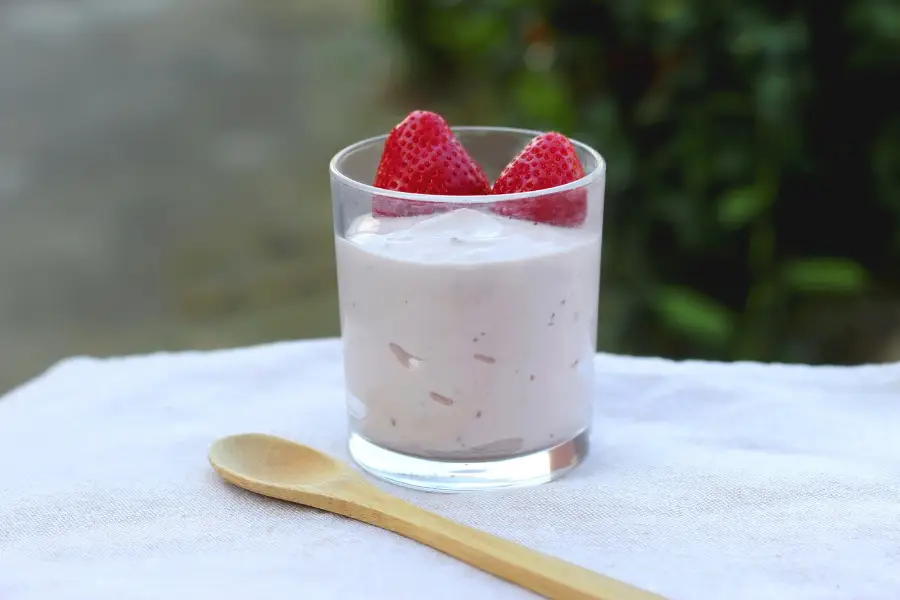Health and fitness are important and integral components of a balanced life. Maintaining good health involves taking care of your body and mind, making sure you get proper nutrition, regular exercise and plenty of rest. Fitness, on the other hand, focuses on physical activity that strengthens the body, improves endurance, and increases flexibility. Together, health and wellness help you feel your best, increase energy levels and reduce your risk of disease. By prioritizing both, you can enjoy a more active and fulfilling life. For which good nutrition is very important. A whey protein diet consists of a variety of protein foods, with the best whey protein being yogurt.
Yogurt has long been a staple in many diets around the world, known for its rich probiotics and versatile nature. But have you ever heard of protein yogurt? This nutritional powerhouse is gaining popularity for its ability to pack a punch when it comes to meeting your daily protein needs. Whether you want to strengthen your muscles, manage your weight, or just enjoy a tasty and healthy breakfast. Protein yogurt is very beneficial for this.

What Is Protein Yogurt?
Protein yogurt is exactly what it sounds like. Yogurt with a high concentration of protein. While traditional yogurt contains a reasonable amount of protein, protein yogurts are specially formulated to be higher, making them an ideal choice for those looking to increase their protein intake without overeating.
So, how is it different from regular yogurt? The main difference is in the protein content. Regular yogurt can have about 5-10 grams of protein per serving, while protein yogurt can offer anywhere from 15-25 grams per serving. This makes it a convenient and effective source of protein, especially for individuals who are active or looking to build muscle.
Nutritional Benefits of Protein Yogurt
Protein is essential for many bodily functions, including muscle repair, enzyme production, and immune system support. For those who are physically active, protein plays a key role in muscle recovery and growth.
But that’s not all. Protein yogurt is also a great source of other important nutrients, including calcium, which is vital for bone health, and probiotics, which support gut health. Some varieties are also fortified with vitamins and minerals, making them even more beneficial.
• High Protein Content:
Aids in muscle repair and growth, making it a great post-workout snack.
• Calcium:
Essential for maintaining strong bones and teeth.
• Probiotics:
Supports digestive health by promoting healthy gut flora.
How Protein Yogurt Fits into Your Diet
Adding protein yogurt to your diet is not only easy, but can also be incredibly beneficial. If you want to manage your weight, protein yogurt can be a great option because protein helps you feel fuller for longer, and reduces the temptation to snack on unhealthy foods. This can lead to an overall lower calorie intake, supporting weight management goals.
Protein yogurt is an easy and tasty way to meet your protein needs for those focused on muscle growth. Especially when eaten after exercise. Compared to other protein-rich foods, such as chicken or eggs, protein yogurt is quick to prepare and can be enjoyed on the go.
Types of Protein Yogurt Available
When it comes to choosing protein yogurt, there are several options available, each with its own unique characteristics. Greek yogurt is perhaps the most popular, known for its thick texture and high protein content. Traditional yogurt, while lower in protein, can still be a good choice when enhanced with added protein.
For those following a plant-based diet, there are also plant-based protein yogurt options made from soy, almond, or coconut milk, which are often fortified with additional protein to match the levels found in dairy-based products.
Greek Yogurt
Greek Yogurt is a type of yogurt that has been strained to remove most of its whey, resulting in a thicker, creamier texture compared to regular yogurt. This straining process also concentrates the yogurt, making it higher in protein and lower in carbohydrates. Greek yogurt is often richer in taste and has a slightly tangy flavor. It can be enjoyed on its own, used in cooking and baking, or served as a base for dips and sauces. Greek yogurt is also known for being a good source of probiotics, calcium, and other essential nutrients.
Traditional Yogurt
Traditional Yogurt is a type of yogurt made by fermenting milk with live bacterial cultures, typically Lactobacillus bulgaricus and Streptococcus thermophilus. The fermentation process thickens the milk and gives it a tangy flavor. Unlike Greek yogurt, traditional yogurt is not strained, so it retains more liquid, known as whey, which gives it a smoother, creamier consistency. Traditional yogurt has a balanced nutritional profile, offering a good source of protein, calcium, and probiotics, but with a lower protein content and slightly higher carbohydrate content compared to Greek yogurt. It can be enjoyed plain, sweetened, or flavored, and is often used in a variety of culinary applications, from breakfast dishes to desserts and savory recipes.
Plant-Based Yogurt
Plant-Based Yogurt is a dairy-free alternative to traditional yogurt, made from plant-derived ingredients such as soy, almond, coconut, oat, or cashew milk. Like dairy yogurt, it is created by fermenting these plant-based milks with live bacterial cultures, which thicken the mixture and give it a tangy flavor. Plant-based yogurt is often enriched with additional nutrients, such as calcium and vitamin D, to make it nutritionally comparable to dairy yogurt.
This type of yogurt is a popular choice for vegans, those with lactose intolerance, or anyone seeking to reduce their consumption of animal products. Plant-based yogurt comes in a variety of flavors and textures, and can be enjoyed on its own, in smoothies, or as an ingredient in cooking and baking.

How to Choose the Best Protein Yogurt
When shopping for protein yogurt, it’s important to read the label carefully. Look for products that have a high protein content, low sugar levels, and minimal artificial additives. If you have dietary restrictions, such as lactose intolerance or a vegan lifestyle, make sure to choose options that meet your needs, such as lactose-free or plant-based yogurts.
Consider these tips when selecting your protein yogurt:
- Check the protein content: Aim for at least 15 grams per serving.
- Watch out for added sugars: Choose unsweetened or low-sugar varieties.
- Avoid artificial ingredients: Opt for yogurts with natural flavours and ingredients.
Delicious Ways to Incorporate Protein Yogurt into Your Meals
Protein yogurt is incredibly versatile and can be enjoyed in a variety of ways throughout the day. For breakfast, try adding it to smoothies for a creamy texture and protein boost. You can also layer it with fruits, nuts, and granola to create a satisfying parfait.
Looking for a healthy snack? Pair protein yogurt with fresh fruits like berries or bananas, or add a handful of nuts for a crunchy texture. And if you have a sweet tooth consider using protein yogurt as a base for a healthier dessert by mixing it with honey, cocoa powder or even some dark chocolate chips.
Breakfast Ideas
Protein yogurt breakfast ideas can turn your morning meal into a nutritious and satisfying start to the day. Protein yogurt is versatile and can be used in a variety of ways to create a delicious, balanced breakfast. Here are a few ideas. Smoothies, parfaits, topped with fruit and granola.
Snack Ideas
Snack ideas using protein yogurt are perfect for when you need a quick, nutritious, and satisfying bite. Here are some delicious and healthy breakfast options that contain protein yogurt. Which can be used with fruits, nuts, seeds or as a dip for vegetables.
Dessert Ideas
Dessert ideas using protein yogurt can satisfy your sweet tooth while providing a healthy dose of protein. Here are some delicious and nutritious dessert options that include protein yogurt. Mix with honey, cocoa or dark chocolate for a healthy treat.
Common Myths and Misconceptions About Protein Yogurt
Despite its many benefits, there are some misconceptions about protein yogurt that can deter people from trying it. One common myth is that all yogurt is high in sugar. While some flavoured yogurts can be loaded with added sugars, many brands offer low-sugar or unsweetened options that are just as tasty.
Another misconception is that dairy products like yogurt are unhealthy due to their fat content. However, protein yogurt can be a part of a balanced diet, especially when choosing low-fat or fat-free varieties. It’s also important to differentiate between natural sugars found in milk and added sugars, which can vary significantly between brands.
Protein Yogurt at Home
Making your own protein yogurt at home is easier than you might think and allows you to control the ingredients and flavours. All you need is some high-quality milk, a yogurt starter culture, and a protein supplement like whey or plant-based protein powder.
Here’s a simple recipe to try:
- Heat 4 cups of milk to 180°F, then let it cool to 110°F.
- Stir in 1/4 cup of yogurt starter culture and 1/4 cup of protein powder.
- Pour the mixture into a jar and let it sit in a warm place for 8-12 hours.
- Once set, refrigerate your yogurt for a few hours before enjoying.
You can customise your homemade yogurt by adding fruits, honey, or other natural flavours.
Top Brands of Protein Yogurt to Try
With so many options available, it can be overwhelming to choose the right protein yogurt. Here are a few top brands that are known for their quality and taste:
Chobani Complet
Chobani Complete is a type of high-protein yogurt designed to offer balanced nutrition, particularly for those looking to increase their protein intake. It is part of Chobani’s product line and is marketed as a complete nutrition option, featuring 15-25 grams of protein per serving, depending on the variety.
Chobani Complete is lactose-free, making it suitable for those who are lactose intolerant. It also contains added probiotics, which are beneficial for gut health, and is made with no added sugar, relying instead on the natural sweetness of the ingredients. This yogurt is also rich in fiber and provides a good source of essential amino acids, making it a well-rounded choice for a snack, meal replacement, or post-workout recovery.
Available in a variety of flavors, Chobani Complete offers a convenient and nutritious option for anyone looking to incorporate more protein into their diet without compromising on taste or quality.
Oikos Triple Zero
Oikos Triple Zero is a high-protein yogurt developed by Dannon, designed to be a healthy option for those looking for a nutritious snack or meal ingredient. The name “Triple Zero” refers to its three main attributes: no added sugar, no artificial sweeteners, and no fat. This makes it a popular choice for individuals looking to manage their sugar and fat intake while enjoying delicious, satisfying yogurt.
Oikos Triple Zero contains 15 grams of protein per serving, making it a great option for those looking to increase their protein intake, whether for muscle recovery, weight management, or general nutrition.It is also rich in dietary fiber and contains live and active cultures, which support digestive health.This yogurt comes in a variety of flavours: vanilla, strawberry, and mixed berry.
Siggi’s Icelandic Yogurt
Siggi’s Icelandic Yogurt Siggi’s Icelandic Yogurt is a type of yogurt known for its thick, creamy texture and high protein content. This yogurt is inspired by traditional Icelandic skyr, a dairy product that has been a staple in Iceland for over a thousand years. Siggi’s is made by straining the yogurt to remove much of the whey, resulting in a product that is thicker and more concentrated in protein compared to regular yogurt.Siggi’s Icelandic Yogurt is made with simple ingredients and contains less sugar than many other flavoured yogurts on the market. Each serving typically offers 12-15 grams of protein, depending on the variety, making it a popular choice for those looking to add more protein to their diet.
Forager Project
Forager Project is a brand that specializes in plant-based, organic foods, including a line of dairy-free yogurts made from cashew milk. Their products are designed to be a healthy and sustainable alternative to traditional dairy products, catering to vegans, those with lactose intolerance, and anyone looking to reduce their consumption of animal products.Forager Project’s protein yogurts are known for their creamy texture and high nutritional value. These yogurts are rich in probiotics, which support gut health, and contain added protein to make them a more satisfying snack or meal option. Unlike some other plant-based yogurts, Forager Project’s yogurts are free from soy, gluten, and preservatives, aligning with the brand’s commitment to using simple, organic ingredients.
Protein Yogurt for Specific Dietary Needs
If you have specific dietary needs, such as following a vegan or low-carb diet, there are plenty of protein yogurt options to choose from. Vegan yogurts made from soy, almond, or coconut milk are becoming increasingly popular, with many brands now offering high-protein versions that rival their dairy-based counterparts. For those on a low-carb or keto diet, look for protein yogurt that is low in sugar and high in healthy fats. Greek yogurt, in particular, is a great option as it tends to be lower in carbs and higher in protein compared to traditional yogurt.
Protein Yogurt vs. Protein Shakes: Which Is Better?
Both protein yogurt and protein shakes are popular among those looking to increase their protein intake, but which one is better? It ultimately comes down to personal preference and your specific nutritional needs.
Protein shakes are quick and convenient, making them ideal for on-the-go nutrition. However, protein yogurt offers additional benefits such as probiotics and calcium, making it a more well-rounded option. Additionally, protein yogurt can be more satisfying and filling due to its thicker texture and the presence of healthy fats.
- Protein Shakes: Convenient, quick, often higher in protein.
- Protein Yogurt: More satisfying, contains probiotics and calcium.
The Environmental Impact of Protein Yogurt
As with any food product, it’s important to consider the environmental impact of protein yogurt. Dairy production can have significant environmental effects, including greenhouse gas emissions and water usage. However, many brands are making efforts to adopt more sustainable practices, such as using recyclable packaging, sourcing milk from grass-fed cows, and reducing waste in their production processes.
If you’re concerned about the environmental impact, consider choosing protein yogurt from brands that prioritize sustainability, or opt for plant-based options which generally have a lower environmental footprint.
Conclusion
Incorporating protein yogurt into your diet can offer a range of health benefits, from supporting muscle growth to aiding in weight management. With so many options available, from Greek to plant-based varieties, there’s something to suit every taste and dietary need. Whether you’re looking for a post-workout snack or a delicious addition to your breakfast, protein yogurt is a versatile and nutritious choice that’s worth exploring.
So, have you tried protein yogurt yet? If not, now’s the perfect time to give it a try and discover the benefits for yourself!
FAQs
Is protein yogurt good for weight loss?
Yes, protein yogurt can be beneficial for weight loss as it helps you feel fuller for longer, reducing the urge to snack on unhealthy foods.
Can I eat protein yogurt every day?
Absolutely! Protein yogurt can be enjoyed daily as part of a balanced diet, providing a convenient and tasty way to meet your protein needs.
Is protein yogurt suitable for children?
Yes, protein yogurt can be a healthy snack option for children, providing them with essential nutrients like protein and calcium. However, it’s important to choose varieties with low sugar content.

